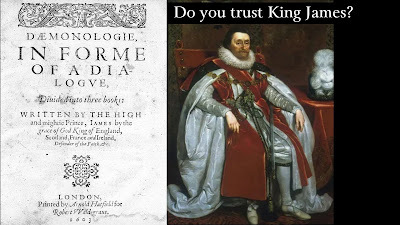Can King James be Trusted?
Can King James be Trusted?
In 1597 King James 1 wrote a book called Demonology:
King James wrote a dissertation titled Daemonologie that was first sold in 1597, several years prior to the first publication of the King James Authorized Version of the Bible. Within three short books James wrote a philosophical dissertation in the form of a Socratic dialogue for the purpose of making arguments and comparisons between magic, sorcery and witchcraft, but wrote also his classification of demons.

In writing the book, King James was heavily influenced by his personal involvement in the North Berwick witch trials from 1590. Following the execution of an alleged sorcerer in the year 1591, the news of the trials was narrated in a news pamphlet titled Newes from Scotland and was included as the final chapter of the text. The book endorses the practice of witch hunting in a Christian society. King James may also have been prompted to write the Daemonologie by an anonymous critical pamphlet John Upaland which circulated in 1597 and alleged the Scottish court was bewitched.
James begins the book:
The feaefull aboundinge at this time in this countrie, of these detestable slaves of the Devil, the Witches or enchanters, hath moved me (beloved reader) to dispatch in post, this following treatise of mine (...) to resolve the doubting (...) both that such assaults of Satan are most certainly practised, and that the instrument thereof merits most severely to be punished.
As detailed in his preface, the main sources of this work were that of historically confessed witches, judicial case history and the Bible itself. He also amassed various dissertations on magical studies to expand his education on the relationships between infernal spirits and men. James generally sought to prove that the devilish arts have always been yet still are, but also explains the justification of a witch trial and the punishments which a practitioner of the dark arts merits.
He also reasons scholastically what kinds of things are possible in the performance of these arts, and the natural causes of the Devil's power with the use of philosophical reasoning. King James sought to prove the existence of witchcraft to other Christians through biblical teachings. His work is separated into three books based on the different arguments the philosophers discuss, with citations of biblical scripture throughout the text.



